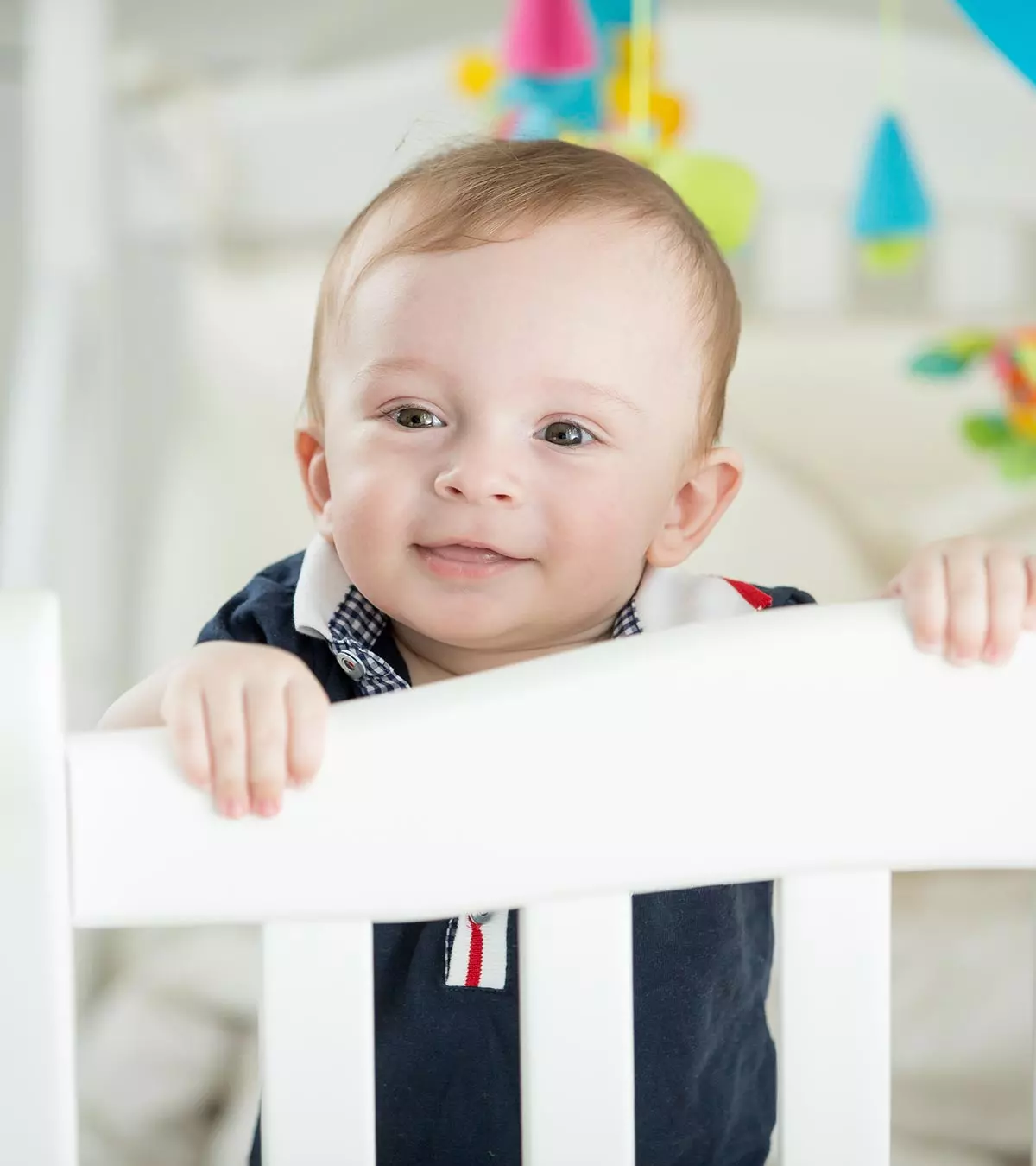
Image: ShutterStock
Preschool, also known as kindergarten or pre-kindergarten in many countries, is where three- to five-year-old children take their initial steps toward formal education. However, despite the ubiquitous existence of preschools, parents may have reservations about the advantages of a preschool and how effective it is in preparing children for school and college. Though preschool is considered the starting point for a child’s education, it’s natural to have such doubts as a parent, and you may question whether you can skip preschool altogether. To assist you in making a decision, this article provides you with a summary of the benefits and drawbacks of sending your child to a preschool.

Key Pointers
- Preschool offers early development of social and emotional skills such as relationship-building, teamwork, and emotion regulation.
- Preschool can lead to improved cognitive function, healthy weight, and better preparation for higher education.
- Skipping preschool may result in difficulty adjusting to social interactions in school.
- Preschool may not be suitable for children with developmental delays and could become overwhelming if it becomes too academic.
What Are The Advantages Of A Preschool?
Psychologist Ehab Youssef opines, “One of the biggest benefits of preschool is that it teaches children how to navigate relationships, regulate emotions, and develop independence. I worked with a little boy who was extremely shy and hesitant to engage with other kids. His parents were worried about how he’d adjust, but within a few months of preschool, he gained confidence, practiced turn-taking, and even stood up for himself when needed.” Preschools provide children with the initial resources for social interactions. It could mean that a child can reap some benefits out of attending a preschool. We list some of them here (1) (2).
1. Head start in social and emotional skills
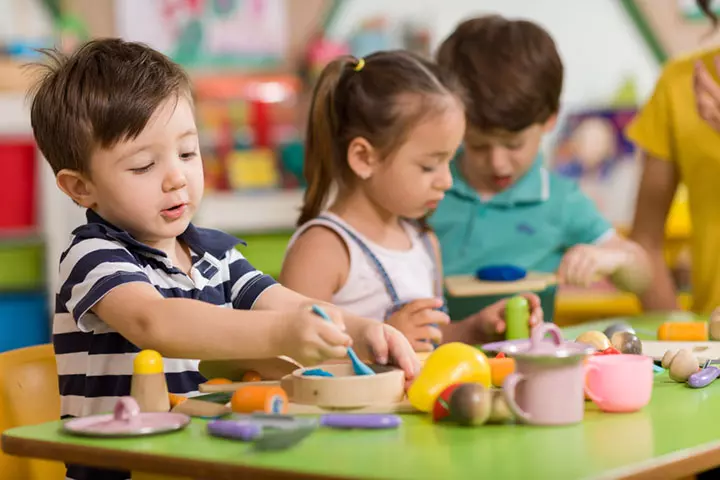
Participation in early childhood education (ECE) programs is associated with improvements in children’s social skills and school progress (3). At a preschool, the child is surrounded by several other kids, teachers, and staff. It is unlike home where a kid has the company of the parents and a few family members only. Exposure and interaction with other people involve multiple emotions and help them develop socialiThe capacity to effectively engage in conversation and communicate to create and maintain social relationships. and emotional skills such as creativity, imagination, confidence, independence, teamwork, problem-solving, and critical thinking. Preschool programs have also been linked to better emotion management and emotional well-being in later years, contributing to reduced conduct problems (4).
A significant number of these skills learned at preschool can go a long way in helping the child in the future. A few social and emotional skills that a child is likely to learn at preschool are (5):
- Forming a rapport with peers and spending time with them in a group.
- Initiating conversations and working in teams during play.
- Listening to directions and obeying rules by teachers or other elders with a sense of discipline.
- Performing an instructed task.
- Regulating one’s emotions and displaying appropriate behavior while receiving feedback.
- Observing and understanding the emotions of peers and learning to respond correctly.
It is not uncommon for parents to discover that their child who was usually reserved and fussy at home has turned cooperative and interactive after attending preschool. The achievement of such milestones by the child is one of the main reasons most parents consider sending their child to preschool.
2. Enhances language skills
Preschool offers a structured environment where children can develop and enhance their language skills effectively. Through daily interactions with teachers and peers, storytelling sessions, and engaging group activities, children are exposed to rich vocabulary and diverse communication styles (6). These experiences help them learn to express themselves clearly, build confidence in speaking, and develop listening and comprehension skills. Additionally, participating in discussions and collaborative play fosters social communication, laying a strong foundation for advanced language development as they grow.
Amber Warder, a mother, shares how preschool has helped her son with a mild speech delay learn more words. She says,“ What I’ve learned since he’s been at school is that despite the fact that I work with him day in and day out on his speech and despite the fact that he has a licensed speech therapist who comes to our house and works with him once a week, being in school has made a huge difference. I mean, he’s gained probably 20 words in the two weeks since he started preschool. I think it’s just because being in that environment, not having somebody there to forecast his needs, has caused him to stretch. He’s had to learn that words are okay, words are meaningful, and you have to use them sometimes. And there’s not a day that goes by now that he does not surprise me with a new word that he knows, and that has been amazing (i).”
3. Promotes cognitive skills and offers other health benefits
The social interaction and time-spent with peers at preschool are said to improve the overall cognitive functionsiThe mental operations that enable us to think, learn, and comprehend our surroundings. of the child (7). Research from the National Institute for Early Education Research (NIEER) shows that early childhood programs can improve IQ in the short term and have lasting positive effects on school performance, staying on grade level, and social skills (8). Some studies even suggest that early preschool education could have a tangential positive impact on other aspects of the child’s health and nutrition. According to the US Center for Disease Control and Prevention, children who attended preschool tend to push their body mass index (BMI) into the healthy range (9). Overweight children began to attain healthy weight while those that were underweight gained weight.
The study noted that one of the probable causes for this could be an improvement in the child’s ability to cope with stress. Preschool might help children deal with psychological stress as it teaches them to regulate behavior. Stress and behavioral problems even in young children are associated with an increased risk of obesity.
4. Benefits the child in higher education

Attending preschool at age 4 significantly increases the likelihood of attending college, indicating long-term academic benefits (10). Studies show that children who attend pre-K enter kindergarten with better academic skills and stronger executive functioning than those who do not (11). Researchers from the University of Manitoba found that, children who attended full-time kindergarten (six hours a day) displayed better language and mathematics skills. The study states, “The results suggest that targeted FDK programs may engender some long-term benefits in mathematics for lower socioeconomic status students, particularly girls (12).” Early math skills like understanding size, shapes, and patterns, counting verbally, and recognizing numerals can be the foundation for advanced mathematical skills in higher education. There are different wonderful activities to make these mathematical concepts easily understandable to preschoolers that lay the foundation for higher education. These are taught through various mathematical tools, which are colorful and highly engaging for toddlers (13).
5. Nurtures the child’s curiosity
Preschools instill imagination and creativity among children, making them curious adults. Children gain the ability to see the world around them through different playful activities, which help them to become creative and curious individuals to explore the world around them (14).
6. Encourages physical development
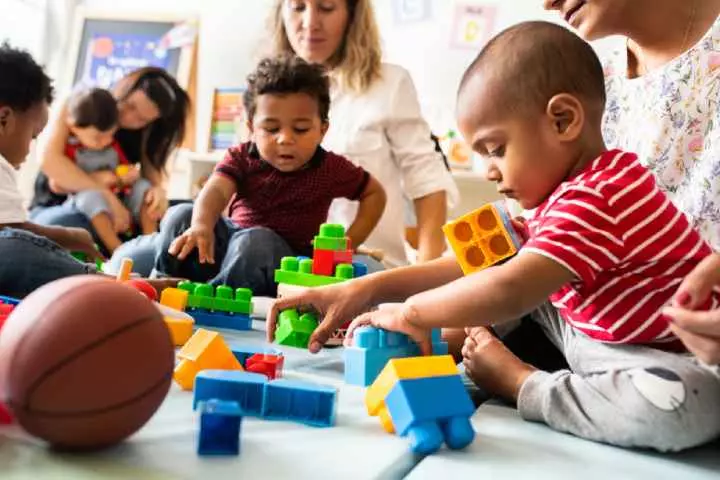
Preschool not only fosters a child’s social and emotional development but also provides an opportunity for physical development (15). Preschools often provide ample space for children to engage in physical activities like running, jumping, climbing, and playing with balls that promote the development of gross motor skills and contribute to improved self-expression. It has also been seen that children with well-developed motor skills tend to exhibit greater confidence in their abilities. Additionally, regular physical activity in early childhood may influence cognitive development, promoting a sense of accomplishment, positive self-esteem, and an understanding of spatial awareness (16).
7. Keeps in line with the peer trends
A child who skips preschool and joins the main school directly might miss social interactions and the routine and structure of preschool, thus finding it difficult to interact with their teacher and classmates. Also, a child with delayed preschool exposure by a year (called ‘redshirting’) will join a preschool class with most students being a year younger than them, and thus it could be difficult to adjust. However, if the child is outspoken and friendly by nature, then these scenarios may not be a problem.
Parents gave importance to early childhood education, which can be seen in the trend depicted in the below graph. There was an increase in the number of enrolled three and four-year-olds to 47.4% between 2005 and 2008. The number declined till 2013, and it can be speculated that the recession caused it. It can be inferred from the graph that the number of preschool enrollments has slightly increased since 2013.

Percentage of 3-4-year-olds enrolled in a preschool (2005-2019)
Source: Heightened Focus on Early Childhood Education Programs as Preschool Enrollment Increased Before COVID-19; US Census Bureau/ACS Do remember
Do rememberThe advantages of sending your child to a preschool are significant. But preschool education has its set of drawbacks.
What Are The Disadvantages Of Preschool?
Certain aspects of preschool education may not work well for a child. Below is a list of the likely disadvantages of preschool education:
1. Does not accommodate children with developmental delays
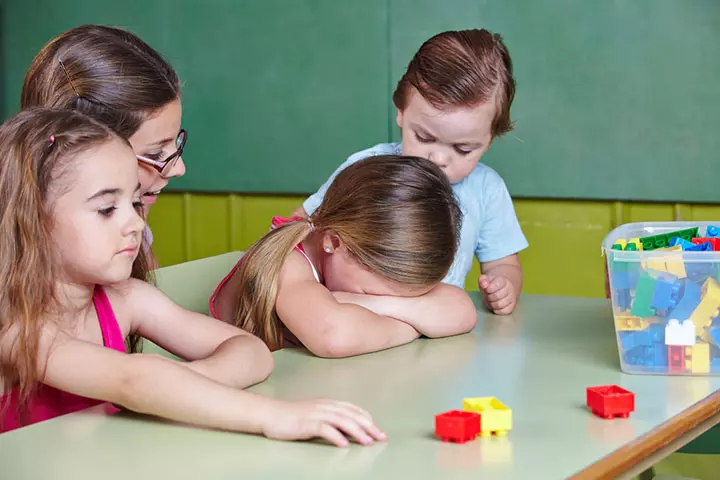
Children with developmental delays may have a hard time adjusting to the environment of a preschool. The nature of school activities may be staggering for a child who is slow at cognitiveiThe development of the child’s brain and mental abilities. and physical growth. Not all preschools have provision to adapt to slow learners among the group, and the child may feel alienated. Studies suggest that children with developmental delays may exhibit more behavior problems, which can be challenging in a preschool environment that lacks adequate support structures (17).
The problem can be more acute with children with special needs, for instance, those with autism. Children with autism can be slow in social interaction and can get overstimulated quickly (18). Therefore, a conventional preschool may not be an ideal place for them. The key to addressing the accessibility problem for children with special needs would be finding an appropriate and helpful program.
2. Focus on academics

Some full-day preschool programs may become excessively academic to the point that the preschool becomes like the first grade. That is not appropriate for children since they are still learning basic skills and may not be mentally ready to plunge into academics. Children who are slow learners, but do not have developmental delayiWhen a child's growth and development (such as talking and walking) lag behind normal, impacting one or more developmental areas. , will still find the pressure daunting. Of course, the nature of education varies from one preschool to another. Nevertheless, imparting academic skills, even if basic, may not be a good idea (19).
Rachel Norman, a mother of five and author, took all things into consideration and decided not to send her children to preschool. Instead, she lists out several things she would do with her kids during the day, one of which is doing school for fun. She says, “My kids love ABCmouse. The kids get to create their own learning path and do lessons that are interactive, fun, and suited to the child’s level. My kids think it’s so fun they’ll watch each other play. The standards are up to the public school level and it’s a great way to add in a bit of learning without the drama. My daughter is quite bright. Because of that I know it’s good to challenge her, but I also know that she challenges herself. We bought this Amelia Bedelia set for her first chapter books, and we’re already looking forward to the next books. Kindergarten will start and with it homework and then lessons and units. For now, we’re going to read for fun (ii).”
 Do remember
Do rememberChoosing to send your child to a preschool is a personal choice. However, a right preschool can positively change a child’s life as it can provide them with opportunities for exploration and fun-based learning. As parents, it is essential to choose a good preschool that does not have shortcomings, prioritizes child safety, and provides opportunities for inclusive growth.

Frequently Asked Questions
1. How can a preschool help a child develop language and communication skills?
Preschools provide an environment that allows children to communicate with their peers, which is crucial for building communication skills for kids. They also create a rich atmosphere through play, which aids in developing a child’s language and communication skills.
2. What is the importance of socialization in preschool?
Children need to socialize in preschool as it helps lay the foundation for further social interactions later in life.According to a study, these skills are directly linked to children’s behavioral adjustment in kindergarten and facilitate learning (20). Socialization also helps build a child’s self-esteem, prepares them for school, and creates a sense of diversity.
3. What activities are typically offered in a preschool environment?
Preschools offer a wide variety of activities, such as art and craft, storytelling, music, and outdoor play, which can aid in the overall development of children.
4. How does a preschool prepare children for kindergarten?
A preschool helps children transition smoothly into the structured environment of formal education, where they are required to follow schedules, listen to instructions, and complete tasks. They learn to take part in group activities, which help develop social skills, such as sharing, cooperating, and taking turns. They are also introduced to letters, numbers, and shapes.
If the advantages of a preschool influenced you to enroll your child in one, ensure to place them into a school that suits their needs. Consider their and your requirements before making a final decision. Also, note that your child may be reluctant to attend initially. The sudden switch from a house to a crowded environment may confuse them. Hence, let the progress to a preschool depend on your child’s comfort levels and readiness. You may speak to the preschool authorities and seek permission to take them home if needed. Over time, as they socialize well with their friends and preschool teachers, you may retract the extent of your intervention.
Infographic: Preparing Your Child For School
Starting school is an important milestone for your child and you. While you may be excited about the new opportunities your child would encounter, you may also be nervous about the separation. Scroll through this infographic for tips on preparing your child for school and making the transition smooth. Illustration: Momjunction Design Team
Illustration: Benefits Of Sending A Child To Preschool And 2 Drawbacks
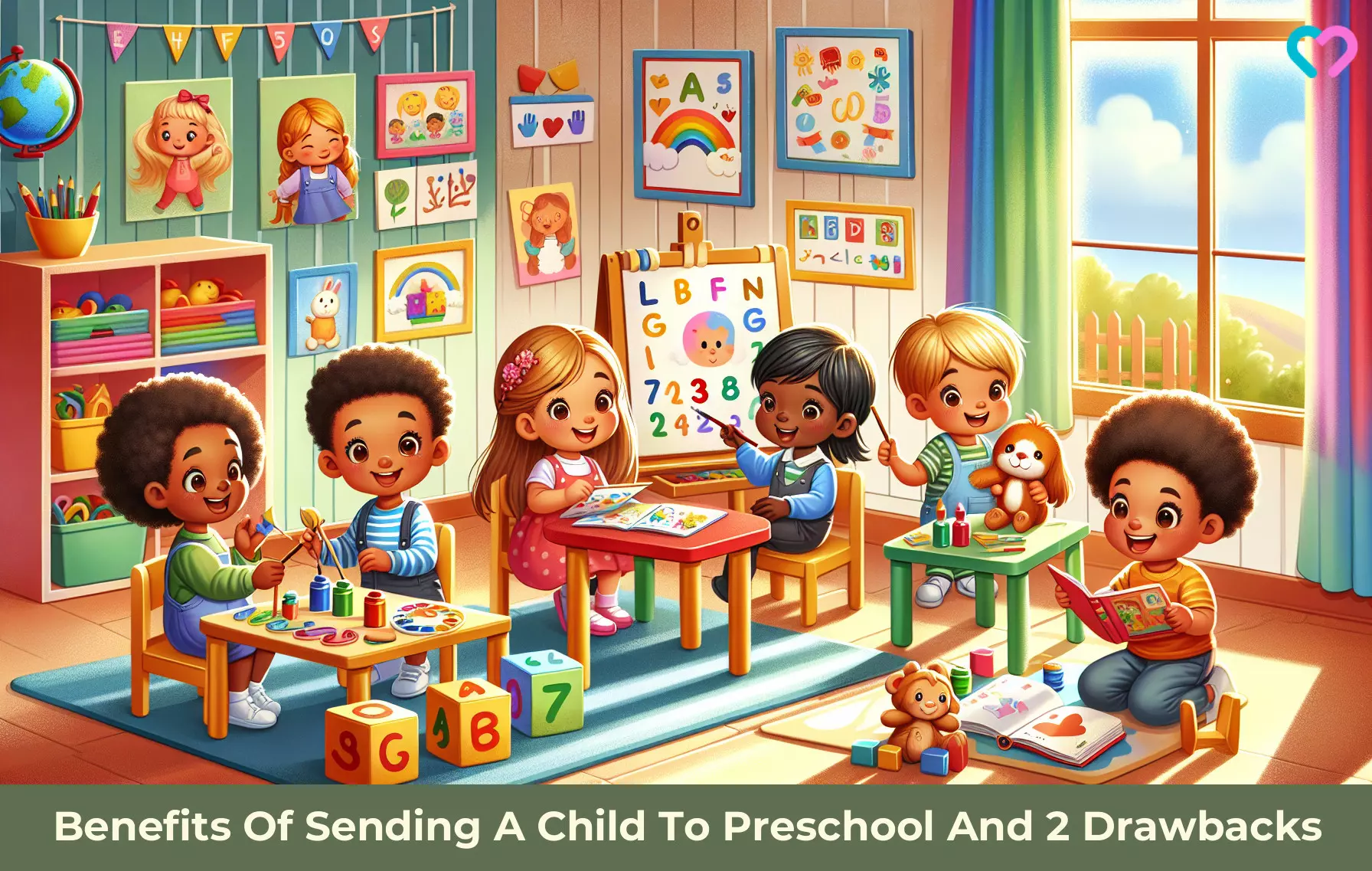
Image: Dall·E/MomJunction Design Team
Personal Experience: Source
MomJunction articles include first-hand experiences to provide you with better insights through real-life narratives. Here are the sources of personal accounts referenced in this article.
i. Story Time | Sending My Toddler to Preschool | The Sensible Mama.https://www.youtube.com/watch?feature=shared&v=fgGkBpQD1Es
MomJunction articles include first-hand experiences to provide you with better insights through real-life narratives. Here are the sources of personal accounts referenced in this article.
ii. Why I’m not sending my 4 year old to preschool and what I’m doing instead;https://amotherfarfromhome.com/alternative-to-preschool/
References:
- Children’s Learning and Development Benefits from High-Quality Early Care and Education: A Summary of the Evidence.
https://www.acf.hhs.gov/opre/report/childrens-learning-and-development-benefits-high-quality-early-care-and-education? - Hani Morgan; (2018); Does High-Quality Preschool Benefit Children?
https://pdfs.semanticscholar.org/39a0/5ad9f27f20bd43d87b33cb32a5937ae7d43e.pdf - Christina F. Mondi et.al; (2025); Fostering socio-emotional learning through early childhood intervention.
https://ijccep.springeropen.com/articles/10.1186/s40723-021-00084-8 - Preschool program linked with better social and emotional skills years later.
https://www.psu.edu/news/research/story/preschool-program-linked-better-social-and-emotional-skills-years-later - Should I send my child to preschool?
https://www.canr.msu.edu/news/should_i_send_my_child_to_preschool - Ning Yang et.al; (2025); Language Development in Early Childhood: Quality of Teacher-Child Interaction and Children’s Receptive Vocabulary Competency.
https://www.frontiersin.org/journals/psychology/articles/10.3389/fpsyg.2025.649680/full - The Importance of Cognitive Development and How Early Childhood Teachers Can Help.
https://post.edu/blog/importance-of-cognitive-development-early-childhood/ - Long-Term Effects of Early Childhood Programs on Cognitive and School Outcomes.
https://nieer.org/research-library/long-term-effects-early-childhood-programs-cognitive-school-outcomes - Julie C Lumeng; (2015); Changes in Body Mass Index Associated With Head Start Participation.
https://pmc.ncbi.nlm.nih.gov/articles/PMC4306793/ - Study: Preschool gives a big boost to college attendance.
https://news.mit.edu/2025/study-preschool-gives-big-boost-college-attendance-0208 - How Long Does the Preschool Advantage Last?
https://www.apa.org/news/press/releases/2025/10/preschool-advantage - MD Brownell et.al; (2014); Long-term benefits of full-day kindergarten: a longitudinal population-based study.
https://pmc.ncbi.nlm.nih.gov/articles/PMC4299551/ - Help Your Child Develop Early Math Skills.
https://www.zerotothree.org/resource/help-your-child-develop-early-math-skills/ - Importance of Play-Based Preschool: 5 Benefits.
https://blog.friendscentral.org/importance-of-play-based-preschool-5-benefits - Do Children Really Need Preschool?
https://www.horizoneducationcenters.org/blog/do-kids-really-need-preschool - Christine A Crumbley et.al; (2019); Physical Activity During Early Childhood: The Importance of Parental Modeling.
https://pmc.ncbi.nlm.nih.gov/articles/PMC6933558/ - Bruce L. Baker et.al; (2003); Pre-school children with and without developmental delay: Behaviour problems and parenting stress over time.
https://www.researchgate.net/publication/10725286_Pre-school_children_with_and_without_developmental_delay_Behaviour_problems_and_parenting_stress_over_time - Autism: Managing Over-stimulation and Stress.
https://mycanopy.org/2025/04/over-stimulation-stress/ - Marcele Kaduce; (1994); Advantages and disadvantages of three types of kindergarten schedules.
https://scholarworks.uni.edu/cgi/viewcontent.cgi?article=3634&context=grp - Robert L Nix; (2014); Promoting Children’s Social-Emotional Skills in Preschool Can Enhance Academic and Behavioral Functioning in Kindergarten: Findings from Head Start REDI.
https://pmc.ncbi.nlm.nih.gov/articles/PMC3845880/ - 6 Reasons Why Preschool Is Good for Your Child.
https://novakdjokovicfoundation.org/6-reasons-why-preschool-is-good-for-your-child/
Community Experiences
Join the conversation and become a part of our nurturing community! Share your stories, experiences, and insights to connect with fellow parents.
Read full bio of Ashley Baldwin
- Ehab Youssef is a licensed clinical psychologist, mental health researcher and writer at Mentalyc. He has done MSc in Psychology at the University of Groningen and worked as a psychotherapist in Luxembourg and Cairo. Ehab currently works as a psychology AI researcher at Mentalyc, where he applies his expertise in psychology and artificial intelligence to develop innovative solutions for mental health care.
 Ehab Youssef is a licensed clinical psychologist, mental health researcher and writer at Mentalyc. He has done MSc in Psychology at the University of Groningen and worked as a psychotherapist in Luxembourg and Cairo. Ehab currently works as a psychology AI researcher at Mentalyc, where he applies his expertise in psychology and artificial intelligence to develop innovative solutions for mental health care.
Ehab Youssef is a licensed clinical psychologist, mental health researcher and writer at Mentalyc. He has done MSc in Psychology at the University of Groningen and worked as a psychotherapist in Luxembourg and Cairo. Ehab currently works as a psychology AI researcher at Mentalyc, where he applies his expertise in psychology and artificial intelligence to develop innovative solutions for mental health care.
Read full bio of Sagari Gongala
Read full bio of Rohit Garoo
Read full bio of Trisha Chakraborty







